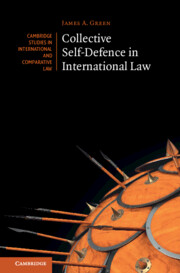Book contents
- Collective Self-Defence in International Law
- Cambridge Studies in International and Comparative Law: 184
- Collective Self-Defence in International Law
- Copyright page
- Dedication
- Contents
- Acknowledgements
- Table of Treaties
- Table of Cases and Arbitral Awards
- Introduction
- 1 Delineating Collective Self-Defence
- 2 The History and Development of Collective Self-Defence
- 3 The Requirements Shared by Individual and Collective Self-Defence
- 4 The Purported Declaration and Request Requirements for Collective Self-Defence
- 5 The Issuer of a Collective Self-Defence Request
- 6 The Manner and Form of a Collective Self-Defence Request
- 7 Collective Self-Defence Treaty Arrangements
- 8 The Relationship between Collective Self-Defence and Military Assistance on Request
- Conclusion
- Bibliography
- Index
- Cambridge Studies in International and Comparative Law
Conclusion
Published online by Cambridge University Press: 04 January 2024
- Collective Self-Defence in International Law
- Cambridge Studies in International and Comparative Law: 184
- Collective Self-Defence in International Law
- Copyright page
- Dedication
- Contents
- Acknowledgements
- Table of Treaties
- Table of Cases and Arbitral Awards
- Introduction
- 1 Delineating Collective Self-Defence
- 2 The History and Development of Collective Self-Defence
- 3 The Requirements Shared by Individual and Collective Self-Defence
- 4 The Purported Declaration and Request Requirements for Collective Self-Defence
- 5 The Issuer of a Collective Self-Defence Request
- 6 The Manner and Form of a Collective Self-Defence Request
- 7 Collective Self-Defence Treaty Arrangements
- 8 The Relationship between Collective Self-Defence and Military Assistance on Request
- Conclusion
- Bibliography
- Index
- Cambridge Studies in International and Comparative Law
Summary
Self-defence is a crucial feature of international law, amounting as it does to the only lawful basis for the unilateral use of military force in the modern world.1 It is not surprising, then, that a vast literature has developed regarding the nature and parameters of the exercise of self-defence in international law.2 However, there has been relatively little consideration of the specific concept of collective self-defence. This is true not just in scholarship3 but also in terms of the way that states discuss or debate self-defence in a general sense.4 Marginalisation of the topic in this way perhaps has been due to the common perception that collective self-defence was effectively ‘invented’ by the drafters of the United Nations (UN) Charter,5 and the view that states have exercised it only very rarely since.6
- Type
- Chapter
- Information
- Collective Self-Defence in International Law , pp. 312 - 320Publisher: Cambridge University PressPrint publication year: 2024

